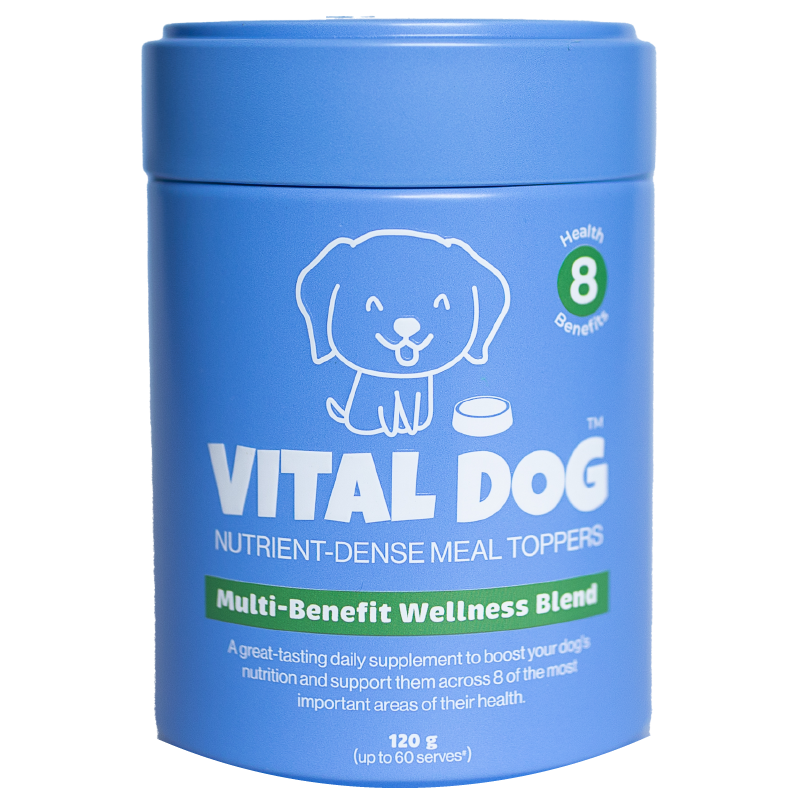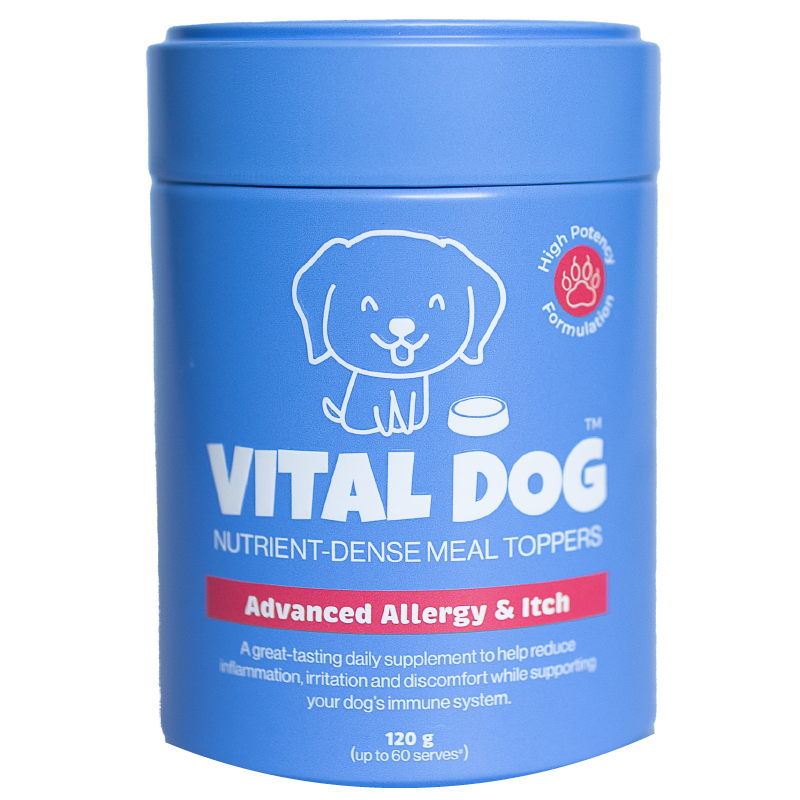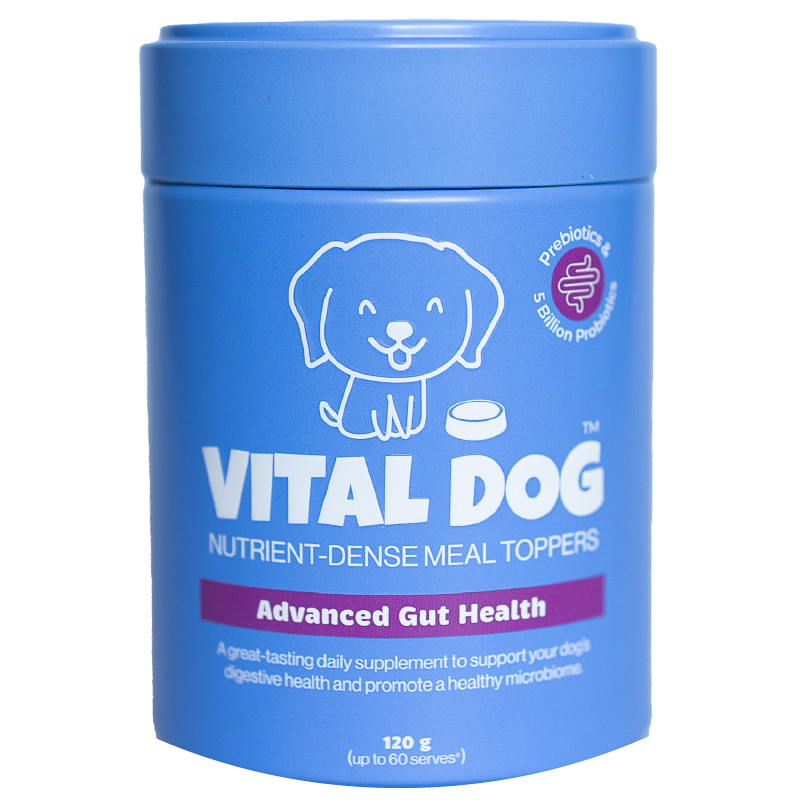In the same way that many of us humans supplement our diets with vitamins, minerals and other nutrients, a growing number of dog parents are doing the same for their dogs. Dog supplements is a fast-growing category, offering numerous health benefits to our furry four-legged friends, but unfortunately there are many manufacturers that cut corners to keep costs down and profits up. In another article, we covered the unnecessary usage of additives such as fillers, flavouring, binders and sweeteners. You can check that out here. This article takes a closer look at the synthetic vitamins that are often snuck into processed dog foods and supplements - and probably your daily multivitamin, too! At VITAL DOG, we believe in empowering dog parents through education, so let's learn a little more about synthetic vitamins and why we choose not to use them in our products.

What are synthetic vitamins?
Synthetic vitamins are lab-made. They aren’t the same as the vitamins you’d find naturally in fruits, veggies, and meats. They’re produced through chemical processes, often starting with compounds extracted from coal tar and petroleum. Yes, you read that right! The same stuff that fuels your car and paves your roads can be used to create the vitamins in some pet supplements.
Not all added vitamins are made synthetically from petrochemicals, but a large number of them are because they’re cheaper and easier to source for manufacturers. Some may argue that it doesn’t matter if a vitamin is synthetic, as long as its final molecular structure is identical to that of a food-sourced compound. We don’t completely agree, for reasons we’ll elaborate on in this article.
The hidden ingredients: what’s really in synthetic vitamins?
You might be wondering, "What exactly are these petrochemicals used to make synthetic vitamins?" Let's look at a few examples:
- Vitamin A: Often synthesized from acetone and beta-ionone, derived from petroleum.
- Vitamin B1 (Thiamine): Can be produced from coal tar derivatives and formaldehyde.
- Vitamin B6 (Pyridoxine): May be synthesized from petroleum-derived chemicals, such as acetone and ammonia, through a complex chemical process.
- Vitamin E: Typically made from trimethylhydroquinone and isophytol, both of which are derived from petroleum.
Keen to have your dog chowing down on these?
Shortcomings of synthetics
The use of synthetic vitamins in food is a controversial topic. Without synthetic vitamins, very large categories including fortified breakfast cereals, bread, human supplements and commercial pet food would no longer be viable. The heat processing used in making these foods destroys nutrients, including vitamins, so they need to be added back in through synthetic fortification in order to make health claims and meet regulatory standards. There are some big, powerful lines of defence with convincing rhetoric that advocate for the incorporation of synthetic additives in food. We’re not going to simulate a dramatic debate here, instead we will share a few reasons why we think that synthetic vitamins might not be the best choice for your furry friend - you can make up your own mind!
- Lower Bioavailability: Certain synthetic vitamins and mineral compounds are less bioavailable, meaning your pet's body may not absorb and utilise them as effectively as vitamins from whole foods.
- Chemical Residues: Complex manufacturing processes using excessive heat, grains and fortification can lead to unwanted chemical residues that might not be good for your pet’s health.
- Imbalanced Nutrition: Synthetic vitamins are usually isolated nutrients, which means they lack the accompanying cofactors found in whole foods that help with absorption and efficacy.
- Potential Adverse Effects: Some pets might experience adverse reactions to synthetic vitamins, such as digestive upset or allergic reactions. This is often difficult to tie to an isolated synthetic micronutrient as they’re usually mixed in with a myriad of other ingredients.
Whole foods vs. synthetic: missing pieces
Let’s loop back on vitamin structure. While its possible for some synthetic and whole food-derived vitamins to have identical molecular structures, vitamins that come from whole foods also come with a host of cofactors—other nutrients and compounds that work synergistically with the vitamin to enhance its absorption and effectiveness. For example, in whole foods, vitamin C is found alongside bioflavonoids, which can enhance its bioavailability and positive health effects.
Synthetic vitamins often lack these cofactors. While they may be structurally identical, they don’t come with the natural "packaging" that whole food vitamins do. This can impact how well dogs absorb and utilise them. Whole food vitamins work synergistically with their cofactors, providing a balanced and effective nutritional boost.
The VITAL DOG difference
At VITAL DOG, we’re passionate about providing the best for your pets. That’s why we steer clear of synthetic vitamins and stick to nature’s offerings. Here’s what sets us apart:
- 100% Real Ingredients: Every ingredient in our products is derived from whole foods. We never use synthetic vitamins or fillers.
- Biologically-Suitable Ingredients: We carefully select ingredients that are not only natural but also suited to your dog’s biological needs over their lifespan.
- Third-Party Testing: Our products are rigorously tested for pesticides and heavy metals to ensure they’re safe and compliant with the PFIAA.
Nutrient-dense ingredients
Here are just some of our favourite nutritious ingredients used across our product range to provide your dog with real vitamins, minerals, amino acids, essential fatty acids and health-promoting compounds:
- Bone broth: rich in essential amino acids like glycine and proline, which support joint health and digestion. It’s also packed with collagen, glucosamine, and chondroitin, which are vital for maintaining healthy joints and connective tissues.
- Beef liver powder: one of nature’s most nutrient-dense foods, loaded with essential vitamins and minerals. It’s an excellent source of vitamin A, which supports vision and immune function, and B vitamins, which are vital for energy production and metabolic health.
- Blueberries: rich in antioxidants, including vitamins C and K, which help combat oxidative stress and support immune health. The fibre in blueberries aids in digestion, while their natural sugars provide a healthy energy boost.
- Pumpkin: a great source of fibre, but it also contains vitamins A, C, and E, as well as antioxidants that support immune health. Its high fibre content aids in digestion and can help regulate bowel movements.
- Green-lipped mussel powder: a fantastic source of omega-3 fatty acids, which support joint health, reduce inflammation, and promote a healthy coat. Additionally, green-lipped mussels provide essential amino acids and minerals like zinc and copper, which contribute to overall vitality and well-being.
- Norwegian sea kelp: a nutrient-dense sea vegetable that provides a natural source of iodine, essential for thyroid health and metabolism. It’s also packed with vitamins A, B, C, and E, as well as minerals like calcium, magnesium, and iron.

Conclusion: nature knows best
For the promotion of wellness, vitality and longevity, we believe that dogs should eat biologically-appropriate foods. In a world where synthetic vitamins are often the norm, VITAL DOG stands out and leads in dog supplements by embracing the natural way. We simply believe that real, whole foods provide the best nutrition for your furry friends. By choosing VITAL DOG meal toppers, you’re choosing products that are expertly-formulated by canine health experts, tested for purity, and packed with nature’s goodness. So, next time you’re shopping for pet supplements, remember the benefits of whole food vitamins and the potential drawbacks of synthetics. It might even make you think about some of the synthetic additives in your own food choices!




